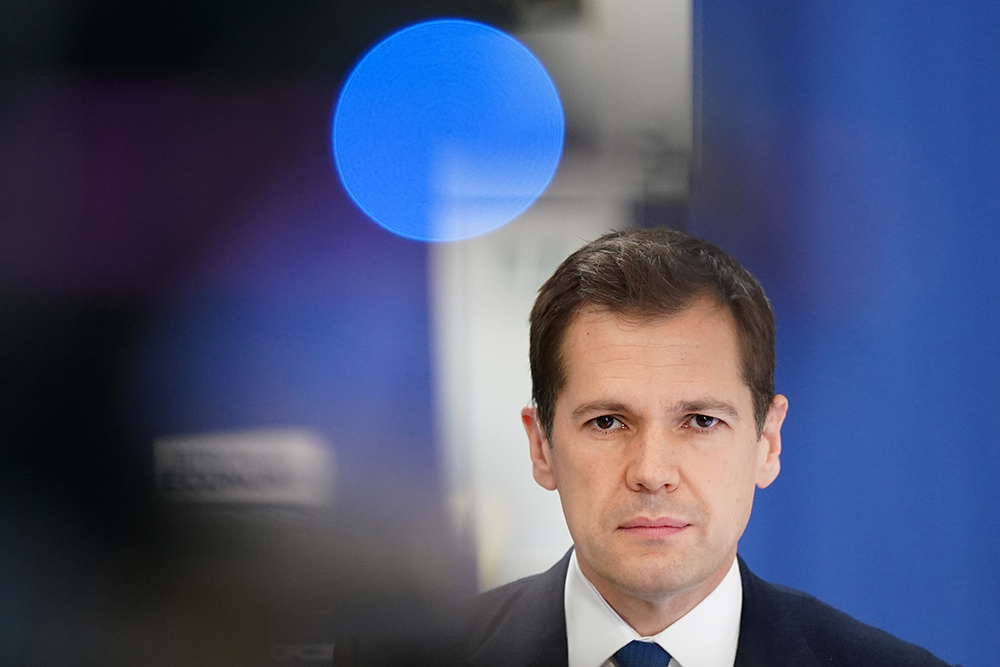Narva, the northern Estonian city right on the border with Russia, has been much in the news of late. Not only is it where the Estonians expect any Russian invasion to take place – most of the rest of the frontier passes straight through the middle of Lake Peipus – but it has also become the scene of constant provocations from the Kremlin. There have been border-demarcation symbols snatched by night, local sat-nav jamming, and a host of psychological wind-ups. In the past month reports have come of a clunky Russian surveillance-zeppelin flying over Narva, sporting the letter ‘Z’. This city – in which an estimated 96 per cent of people speak Russian as their first language – is one we may well be hearing more of in the next few years. There is, as vlogger Bald and Bankrupt pointed out in his YouTube post on Narva, ‘probably no other border in the world, apart from the Korean peninsula, where two different ideologies clash.’
Yet Narva, whose medieval old town was destroyed in world war two and which few Estonians would even think of visiting, has always held a place in my memories. It was where some friends and I spent an eventful New Year’s Eve, in 1996.
At the time, I’d just moved to Tallinn at the time to take up a post as an English teacher – my first visit to Eastern Europe, my first spell living abroad. My friends Simon and Julia, one a literature academic, the other a young American teaching in Poland, had come to stay in my Soviet flat for Christmas. There we drank vodka, hung out with young Estonians and Russians and cooked the scrawniest goose (all we could find) for Christmas dinner. We were young, rootless, starry-eyed about travel, and thrilled to be spending Christmas with people we had chosen. We were charmed by the country too: this was an Estonia pre-tourism, pre-cheap flights, pre-stag party – and it felt both exotic and unknown. That week we did all the Estonian things we could: we drank mulled wine in Tallinn’s Old Town, bought socks at the knitwear market, took lengthy saunas and stayed the night in Kasmu, an idyllic village, complete with forest, on the Baltic coast.
Soon Oleg had slapped on the White Album, drumming with his fingers to ‘Back in the USSR’
Yet I knew all the time what really mesmerised my western friends. It was the sight of Russians – about a quarter of the country’s population – all around us. Gone were the rigid divisions of the Cold War; we were at last able to mingle freely with those people we’d never been allowed to meet, and whom the Iron Curtain had turned into something mythical and sinister. For a time, we toyed with the idea of trying to get a Russian visa and getting the overnight train to St Petersburg. But deterred by the queues and paperwork – and almost afraid of getting what we wanted – we did the next best thing. Early on 31 December, we caught a long slow train from Tallinn station, through forests and snow-covered fields, up to Narva in the north-east. ‘Please tell your friends,’ an Estonian colleague said to me beforehand, ‘that Narva is not a representative Estonian city. We would not wish them to think that it is.’
Our high spirits, arriving there at a cold, sunny lunchtime, were undented by Narva’s Soviet ugliness, or by our search for a city-centre that turned out not to exist. We were perversely charmed by the awful restaurant we ate at, with its menus typed out in Cyrillic (complete with typos), its greasy pork cutlets and its abysmal Soviet service, just as we were delighted with the rooms – half austere, half tacky – we’d rented in a Khrushchev-era hotel. There was clearly nothing to do in Narva but read the Russian street-signs, sit in a bar and drink. So drink we did – Estonian Saku beer and ice-cold Viru Valge vodka – till some local youths (gopniks) tried to start a fight by tipping our lager into their glasses and, with a smirk, daring us to challenge them. Out of nowhere a nice Russian couple, Oleg and Marina, appeared to rescue us, shaming the gopniks with a few snapped words and inviting us back to their apartment.
Oleg and Marina lived on the edge of town in a flat I later realised was quite typical. It had brown carpets and net curtains and the kind of western pop art posters on the walls that early teenagers had in Britain. Here they fed us pickled cucumber and more vodka and Oleg – a good-looking man going to seed, with a thickening waistline and a Beatles moptop – groused about Narva and the Estonians, not necessarily in that order. Oleg was a casual worker, it turned out, in the oil and shale business, and worried constantly about work drying up. He hadn’t applied for Russian citizenship, nor could he get the Estonian kind ‘till I’ve learned their stupid-fuckin’-language and passed a lot of stupid-fuckkin’-language-tests.’ He and Marina felt abandoned.
The town, he said, was one where ‘nothing ever happens. You saw those kids in the bar. They’re probably not bad people, they’re frustrated – nothing to do.’ Tallinn was better of course, he said, but there were too many Estonians there: ‘I’ve tried being friendly but they’re so arrogant with us, so cold…’
It was a familiar refrain. The Estonians, broadly speaking, saw the Russians as noisy, pack-minded, vulgar and unpredictable: a kind of chaos force. In return, Russians said Estonians were dull, stand-offish, soulless and used froideur as a kind of weapon.
‘And they have no real culture,’ Oleg added. ‘Just a load of boring folksongs.’
What, I said, about Arvo Part, the novelist Jaan Kross, the poet Jaan Kaplinski? ‘Well, there’s no Dostoevsky,’ he shrugged. ‘There’s no one like Tchaikovsky.’ He muttered about Russia ‘liberating’ Estonians from the Nazis, how well Tallinn had been looked after in Soviet time, about the ‘good old days’ and the ‘family of Soviet nations.’ Hogwash on all counts, arguably, yet Oleg and his wife – generous and self-sacrificing – were hard to dislike.
Soon Oleg had slapped on the White Album, drumming with his fingers to ‘Back in the USSR.’ He told us about the bootleg tapes of Western bands he’d got in Soviet times and opened another bottle of vodka. Marina put some fried potatoes and chopped tomatoes on the table, dusted with dill. They spared nothing in entertaining us and seemed to expect so little in return.
This is where we were wrong, as we discovered once their child had gone to bed. One moment I was on the balcony smoking a cigarette, the next I’d returned to find Julia shouting: ‘No way! No WAY!’ and Simon trying to calm her down. Oleg, it seemed, after one vodka too many, had suggested ‘watching a VHS together,’ and it was clear from the acres of pink flesh paused on screen that it didn’t star Julie Andrews. Marina was stroking Simon’s hair by now, and Julia getting more and more agitated. Cue 15 tricky minutes, in which our suggestion it was time to leave was countered by Marina and Oleg’s increasingly shrill insistence we should spend the night with them.
This, I should state to save tourist-disillusionment, has never happened with any Russian couple I have met or hung out with since. In fact, it’s never happened with any couple I’ve met or hung out with since. Looking back, I feel some shame at how we disappointed them, and how mean, western and prissy we must have seemed to deny them their bit of fun. Because once Marina and Oleg had finally accepted our departure, they couldn’t have been nicer, hugging us all and arranging for a sober neighbour of theirs to drive us back to town.
We saw in the New Year in one those Russian bars characteristic of the nineties. It doubled up as a disco, employing a local singer to caterwaul his way through a cycle of western pop-classics, armed with little more than a synth, a drum machine and his own lack of shame. Nothing was serious as midnight rolled round – Good old Oleg! Lovely, winsome Marina! What a story to tell back home! – and we were callously happy. Everything, even that awful bar, was new and fascinating to us – just as, we might have reflected later, such places in Narva and the man’s awful singing were stale, sad and utterly demeaning to those like Marina and Oleg, who couldn’t get away. The traveller, said writer Ryszard Kapuscinski, views a place through a wide-angled lens, the local, through a close-up. They are always at cross purposes.
The next day, with the lyrics of ‘Back in the USSR’ still rolling around in our vodka-clouded brains, we made our way up to Narva castle and stared befuddled across the river. There it was, on the other side – Russia, the neutered beast, our former enemy, the place we couldn’t get to but couldn’t avoid, the country we’d never, in all our lives, been able not to think about. Everything, under the January sky, was motionless and frozen. Narva, Oleg said, was the place where ‘nothing ever happens.’ It was, we admitted later, the most interesting New Year’s Eve we’d ever had.







Comments